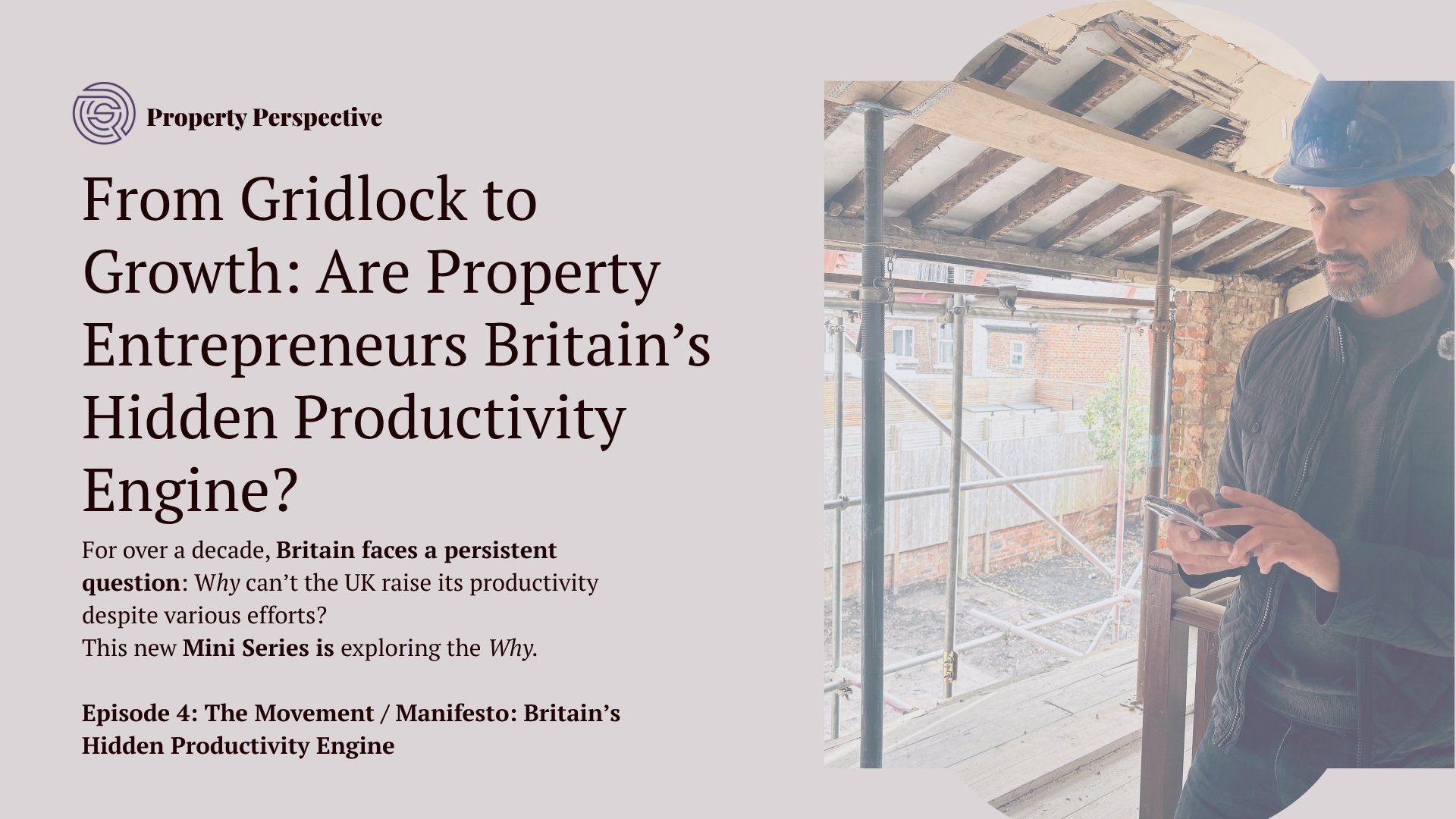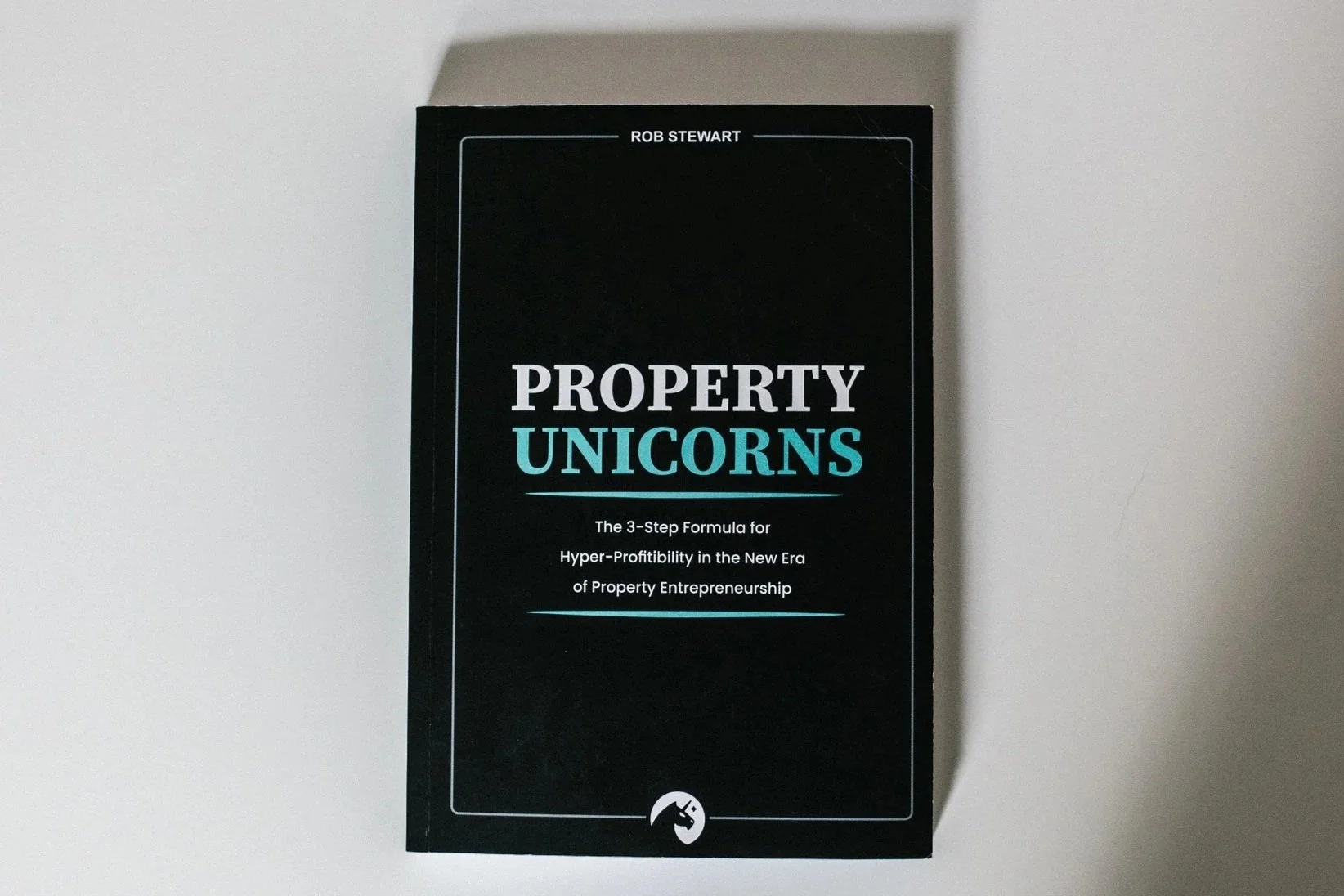The Movement / Manifesto: Britain’s Hidden Productivity Engine
Property Perspective | Episode 4
The Quiet Revolution
Britain’s most effective growth strategy isn’t written in a manifesto. It’s being built, brick by brick, by people the state barely recognises. While Westminster debates housing targets, entrepreneurs across the country are quietly transforming disused offices, obsolete shops, and forgotten upper floors into vibrant new homes and workspaces. They are converting redundancy into productivity, not through subsidies or slogans, but through initiative. They are Britain’s hidden productivity engine — an informal network of creators, builders, and problem-solvers who are doing what government cannot: delivering growth through action. And yet, in the national conversation about “growth,” they are invisible. The media obsesses over tech unicorns in San Francisco. Politicians trade promises about “levelling up.” Bureaucrats draft white papers no one reads. Meanwhile, thousands of small developers….the real builders of renewal, are dismissed as “landlords” or “speculators.” That mischaracterisation isn’t just inaccurate. It’s corrosive. Because it blinds us to the one class of citizens actually doing what Britain desperately needs, turning stagnation into regeneration.
This essay is for them.
It’s a manifesto for a new movement: one grounded in entrepreneurship, intelligence, and civic purpose. The people who, while the state consults, build.
Rob Stewart. Property Perspective
The Age of Institutional Failure
Every generation inherits a machinery of state. Ours is one that no longer works. Britain’s great institutions, from planning to infrastructure to local government, are paralysed by complexity. They were designed for an age of central command and predictable demand, not for a century defined by networks, agility, and exponential change. The result is what economists politely call the productivity puzzle. In truth, it’s a paralysis.
For fifteen years, output per worker has barely moved. Real wages have stagnated. Infrastructure projects run decades late and billions over budget. The public sector consumes more and delivers less. We have drifted into a high-cost, low-capacity equilibrium, where bureaucracy grows but output doesn’t. This is not a failure of effort or ideology. It is a failure of architecture. The state’s internal systems are too slow, too centralised, and too risk-averse to keep up with a society that now moves at the speed of software. We live in an age of institutional obsolescence, a world where the tools that once built prosperity now inhibit it. And into that vacuum steps the entrepreneur.
The Entrepreneurial Class — Britain’s Civic Producers
The small-scale property entrepreneur has become Britain’s most underrated economic actor. They are not hedge funds or developers with glossy brochures. They are local, nimble, and deeply practical. They see potential where others see decay, and they act on it.
A redundant office becomes six studios.
A disused shop becomes a co-living space.
A neglected building becomes an income-producing, tax-generating asset.
Each project is small, but collectively, they amount to a national productivity strategy, just one the Treasury hasn’t noticed yet. What distinguishes these entrepreneurs isn’t just capital; it’s agency.
They do three things government cannot:
They identify latent potential.
They see value in the underused — empty retail, obsolete commercial, dormant upper floors — and reimagine it into productive space.
They mobilise capital quickly.
While the state raises bonds and commissions studies, they raise investors and break ground.
They create adaptive systems.
Each project becomes a live feedback loop — tested, refined, replicated — an agile architecture that learns faster than any government department ever could.
The state is defensive by design. Entrepreneurs are generative by necessity. And in an era when the national balance sheet is exhausted, that generative instinct is our last true growth engine.
From Policy to Practice — The Real Growth Plan
Every political season brings a new slogan for renewal: “Levelling Up.” “Build Back Better.” “Plan for Growth.” Each fades into the same bureaucratic entropy. The truth is that Britain doesn’t need another growth plan. It already has one… it’s just distributed. Across the country, small developers are enacting what I call Distributed Development: a thousand micro-acts of regeneration that collectively achieve what central planning cannot.
Each deal may be small, a £200,000 conversion here, a £300,000 refurbishment there, but together, they compound into macro impact. They are delivering new housing, new workspaces, and new economic capacity without waiting for permission or subsidy. While policymakers agonise over “capacity constraints,” these entrepreneurs are demonstrating that capacity was never the problem, permission was. And here lies the real revolution: AI and data are now amplifying this distributed force. Intelligent entrepreneurs can map opportunity faster than the state can define it. They can see where demand is emerging before the ONS has published the survey. They can model viability, forecast returns, and mobilise investors in days.
That is the new growth engine — bottom-up, intelligence-led, distributed regeneration. It is not ideology. It is arithmetic.
The Manifesto — Principles of the Property Entrepreneur Movement
If Britain is to move from stagnation to renewal, it must recognise and empower this entrepreneurial class. What follows is not policy; it is principle, the moral architecture of a new civic capitalism.
1. Creation Over Extraction
Profit should flow from productivity, not scarcity. We do not hoard existing stock; we create new supply. We turn redundancy into value; socially and financially.
2. Agility Over Bureaucracy
Speed is not a vice; it is a civic virtue. Delay is a tax on progress, and Britain has paid it long enough. The state must learn from the entrepreneurs who build faster, cheaper, and smarter.
3. Intelligence Over Intuition
Data is our new planning permission. We use intelligence to identify where need is greatest and capital most effective. AI is not a threat to human judgement; it is its amplifier.
4. Regeneration Over Speculation
We reject zero-sum investment. Our value creation comes from renewal, not churn. Every project must make a place more productive than we found it.
5. Collaboration Over Isolation
The future will be co-built. Entrepreneurs, investors, and local authorities can form productive alliances, replacing adversarial planning with adaptive partnership. The model is not “private vs public,” but private for public good.These are not slogans. They are operating principles for a new kind of capitalism, one that measures success not just by yield, but by renewal.
The Call to Leadership — From Investor to Institution
For decades, the state has spoken as if entrepreneurs are a risk to be managed. In reality, they are the nation’s best-managed risk: self-funded, self-regulating, and self-correcting. They are Britain’s parallel state, delivering civic outcomes where the public sector has lost capability. When a developer converts a redundant office into affordable studios, they are not just making profit; they are increasing productivity, reducing carbon waste, and rebalancing the housing market…. three government objectives achieved without public spending.
This is Civic Capitalism: private initiative that delivers public value through efficiency, not bureaucracy. It is time to stop vilifying it and start institutionalising it. The question is not how do we regulate them? It is how do we replicate them? The next phase of Britain’s renewal depends on empowering this entrepreneurial class, with access to data, streamlined planning routes, and recognition as a legitimate partner in public purpose. Because Britain’s next great institution will not be a ministry. It will be a movement.A Nation of Builders. History remembers those who build. Every industrial leap — from steam to steel to silicon — began with individuals who refused to wait for permission. Property entrepreneurs stand in that lineage. They are today’s builders of tangible productivity, reactivating assets, creating jobs, and restoring civic pride in places that Westminster forgot.
The irony is that the state’s failure has forced a form of creative federalism. Power has devolved not by decree, but by default, into the hands of those who still act. That is where Britain’s renewal will come from: a thousand projects, each small enough to start, yet significant enough to matter.
The macro future will be built micro-first.
Closing Perspective — The Manifesto for Renewal
Over four essays, we’ve traced an evolution.
Episode 1 — The State as Bottleneck: diagnosing the dysfunction that throttles Britain’s growth.
Episode 2 — AI as Compass: exploring how intelligence gives entrepreneurs the edge.
Episode 3 — Creator Spaces: showing how intelligent entrepreneurship reshapes the built environment for modern life.
Episode 4 — The Manifesto: uniting those insights into a civic movement.
Together, they form a coherent thesis: That Britain’s productivity crisis will not be solved by the state. It will be solved by those who think, build, and act faster than it can.
We are not landlords. We are not speculators.
We are builders of Britain’s next chapter — the invisible infrastructure of national renewal. The state counts dwellings. We design destinies. And the future, as ever, will belong to those who build it first.
Rob Stewart Property | Property Perspective Series
For a deeper exploration of these ideas
including frameworks like The Unicorn Model and Creator OS, get your copy of Property Unicorns and join the movement redefining what it means to build Britain’s future.


